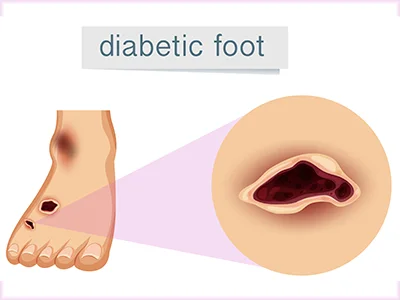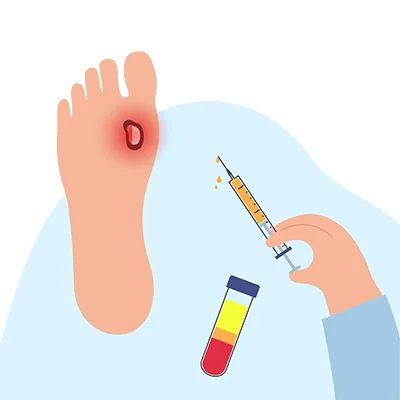-
 Mail us
Mail usinfo@myhealthhospitals.com
-
 Toll Free
Toll Free+91 9111674111
- Book Appointment
Vascular Surgery
Diabetic foot ulcers are common complications in individuals with diabetes, often caused by poor blood circulation and nerve damage (neuropathy). These open sores or wounds usually develop on the bottom of the feet and can lead to serious problems if not treated promptly. Without proper care, diabetic foot ulcers may result in infections, tissue damage, or, in severe cases, amputation.
Early diagnosis and treatment are crucial to managing diabetic foot ulcers effectively. Specialized care, including advanced wound management, infection control, and vascular treatments, can help prevent complications and promote faster healing. Regular foot care, such as keeping feet clean, inspecting for injuries, and wearing appropriate footwear, is essential to reduce the risk of ulcers.
At My Health Hospital, vascular specialists like Dr. Puneeth Joopalli provide comprehensive diabetic foot ulcer treatments, ensuring personalized care to enhance healing and improve the quality of life for diabetic patients.

Foot problems often occur in people with uncontrolled diabetes and associated with some of these problems parallelly-

A vascular surgeon may recommend several tests to assess the severity of the ulcer and related foot changes, helping determine the best surgical option. Common tests include:

Surgical intervention for diabetic foot ulcers may be necessary when the condition is severe or unresponsive to conservative treatments. Here are the common surgical options:
Debridement - Removal of dead or infected tissue to promote healing and reduce the risk of further infection.
Skin Grafting- Healthy skin is transplanted to the ulcer site to aid in wound closure and faster recovery.
Amputation- In extreme cases where the infection has spread, partial or complete amputation may be required to save the patient’s life.
Reconstructive Surgery- Repairs foot deformities or improves blood flow to prevent ulcer recurrence.
Vascular Surgery- Includes bypass surgery or angioplasty to restore blood flow and support healing in ischemic ulcers.
These procedures are performed based on the ulcer's severity, infection status, and overall patient health. Always consult a specialist for personalized care.
Early signs include redness, swelling, warmth, or an open sore on the foot that doesn’t heal. Pain and foul-smelling discharge may also occur in severe cases.
Prevent foot ulcers by maintaining proper blood sugar levels, practicing good foot hygiene, wearing comfortable shoes, and conducting regular foot exams.
Treatments include wound care, debridement, antibiotics, and in severe cases, surgical options like skin grafting or vascular surgery. Consult a specialist for the best approach.
See a doctor if you notice persistent wounds, swelling, redness, or signs of infection such as fever or foul-smelling discharge. Early diagnosis prevents complications.
If untreated or severe, ulcers can lead to infections requiring partial or full amputation. Timely treatment minimizes this risk and supports recovery.
It might take 1-3 months for an ulcer to heal (with treatment).
If you cannot find answers to your queries, please fill out the ENQUIRY form or call the number below. We will contact you shortly
+91 9111674111Visit any of our My Health Hospitals branches for advanced medical care and expert consultations.
H.No 15-24-212, MIG-212, Rd Number 1, K P H B Phase 1, Kukatpally, Hyderabad, Telangana 500072
H.No:-12-5-30, WhiteHouse, Moula Ali Rd, South Lalaguda, Tarnaka, Secunderabad, Telangana 500017